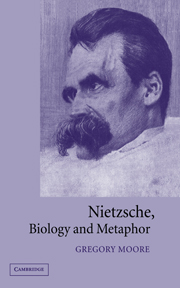1 - The physiology of power
Published online by Cambridge University Press: 22 September 2009
Summary
Was Nietzsche a Darwinist? Or was he, as he himself often claims, an ‘anti-Darwinist’? It is typical of the misunderstandings, misreadings and misappropriations that have plagued the reception of Nietzsche's thought that he has been so frequently identified with one of the very nineteenth-century figures whose theory of evolution he repeatedly sought to challenge and whom he dismissed as an intellectual mediocrity. In Ecce Homo, Nietzsche himself was sufficiently irritated by those who insisted on reading his work – and in particular his proclamation of the Übermensch – in Darwinian terms to complain: ‘learned cattle caused me on its account to be suspected of Darwinism’ (EH III, 1). And yet there can be no question that Nietzsche adopts a broadly evolutionist perspective: he believes in the mutability of organic forms; he sees morality, art and consciousness not as uniquely human endowments with their origin in a transcendental realm, but as products of the evolutionary process itself. In Human, All Too Human, he suggests that the question of how our conception of the world might differ from the ‘true’ nature of the world will be relinquished to ‘the physiology and evolutionary history of organisms and concepts’ (HA 10). And in The Gay Science, Nietzsche rebukes Schopenhauer for rejecting all evolution as chimerical and dismissing Lamarck's insight as ‘an ingenious but absurd error’ (GS 99). But does all this make him a Darwinist? One of the more recent writers to discuss the issue of Nietzsche's supposed ‘Darwinism’ certainly thinks so.
- Type
- Chapter
- Information
- Nietzsche, Biology and Metaphor , pp. 21 - 55Publisher: Cambridge University PressPrint publication year: 2002



